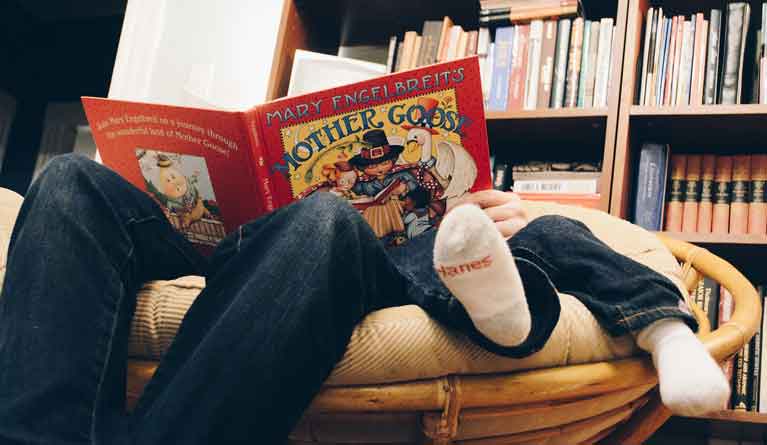How does storytelling help your child? Author, teacher and mum Elizabeth Baguely talked to us about how she became a writer, the importance of storytelling and reading to your children and how to make story time even more magical.
How storytelling helps children
“Storytelling is an opportunity to spending time with your child, cuddling up with them and bonding, which is absolutely crucial. I also think it’s essential that parents, too, suspend their maturity and enjoy the books for themselves. Somehow that enjoyment of a shared text and a shared world is a pathway to communication between parent and child. There is a magic
in escaping the world of socks and Weetabix and going on a fantasy journey together.
Making reading come alive
“I ran an imagination workshop at the Edinburgh International Festival last year, and I found these ‘rules’ certainly worked for us.
- Read with almost exaggerated expression, slowly.
- Describe the pictures to the child and let them find things for themselves as you go along. Maybe ask a few questions but remember it’s not a comprehension exercise and should always, always be for pleasure and not with a specific learning objective in mind.
- Make sure that the children understand what the story means. Take time to explain things to them: new vocabulary, the events of the story and so on. It’s surprising how little children often understand, though we may take it for granted that they do because we do.
- Use voices for the characters if you can.
- Pretend to be the characters from the stories when you are playing with your children. I was never any good at playing with bricks or doing jigsaws, which always seemed so deadly tedious, but I’ve spent endless hours playing at being Mrs Tiggywinkle, the Witch from Each Peach Pear Plum and numerous others.You can do it at the sink, whilst performing other chores, and especially in a car. It opens up new horizons in the child’s mind about taking characters and situations beyond the boundary of the book which is, after all, a springboard for the mind.
Other forms of storytelling
“Story tapes and CDs have their place, although especially with small children, I think that listening to a tape, like watching television, should be a shared activity. They really are brilliant for car journeys and for children who have difficulty reading, who don’t really like it, or who are aural learners.
As a teacher, I would say that listening to stories will, like reading, extend vocabulary and knowledge of sentence and text structures. Many children also come to school with poor attention and listening skills, and although I have no research to prove it, I suspect that listening to a story, whether on tape or from a book, would train them to listen.
Tapes and CDs are also a good training ground for parents who want to learn to read well. Brenda Blethyn Martin Jarvis and their ilk are just superb. Elizabeth Baguely is a teacher, author of Meggie Moon, and mum to Kate (15) and Anna (13). As a novice parent, she couldn’t wait to start reading picture books with her first daughter Kate, which she
described as a ‘lovely, natural thing to do’.
When her second daughter Anna was born, the practice continued. When Elizabeth started getting some decent sleep and time to herself, she tried writing a picture book. She sent a few stories off to publishers, only to have them returned with the obligatory rejection slips. One evening, while doing the washing up and looking out of the window at the stars, the first line of a story about a boy who caught a shooting star came into her mind and the rest of the story tumbled out.
She wrote it on her shopping list, typed it up on a borrowed typewriter and sent it off to Little Tiger Press, who planned to publish it. Unfortunately, that never came to fruition, but they did take a second story, Meggie Moon, which was published in hardback in 2005.”
Why storytime is important
Professor David Fontana, a worldwide expert in child psychology and meditation, stresses the importance of storytime in the introduction to a new book of bedtime stories entitled More Nightlights. “Good stories…demonstrate a range of human behaviour, making it clear to the child that we aren’t all the same: each individual has different concerns, different challenges to overcome…. Storytelling in books…
own pictures of the unfolding tales… This exciting opportunity to go deeply into the mind can also bring feelings of freedom, happiness and calm – away from the stresses of real life.”
“It’s essential for your child’s development that you show a special interest in what he’s thinking, saying, doing or feeling. Talk with him, and listen to what he has to say as much as possible…. When children are aware early in life that their views are prized, it helps them develop a more positive self-identity. As a bonus, if you listen to what your child has to say, he’s more likely to listen to you!”
Where to find out more
National Storytelling Week runs throughout the first week in February.
For more information, visit The Society for Storytelling at www.sfs.org.uk. The National Literacy Trust is an independent charity established to promote a literate nation and runs a Family Reading Campaign.
Book Start aims to provide a free pack of books to every baby in the UK to inspire and maintain a love of reading.








Leave A Comment
You must be logged in to post a comment.